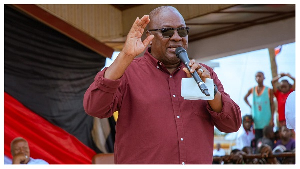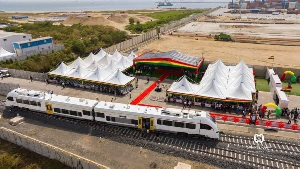If the cumulative effect of the number of conferences one participated in, actually created success for the countries with participants, the African continent would be a success story. More than often, when one examines our current state of affairs, and that especially of Ghana, in contrast to the rest of the world, the question comes up: What have these many conferences achieved, with respect to time, resources and just the issues discussed at any of these many conferences.
I could not help but agree more with the comments of the Senegalese President Abdoulaye Wade, in the article http://www.ghanaweb.com/GhanaHomePage/NewsArchive/artikel.php?ID=73502, Posted on Ghanaweb, General News of Sunday, 16 January 2005.
?We're spending a lot of money and, above all, losing time with repetition and conferences that end and you're not quite sure what they've achieved," ?"It's tragic," he said. "We need some people who know how to administer projects. We don't need PhDs. We need managers."
It is heartbreaking, many times when one follows the decision making process in several fronts of our Ghanaian economy, especially with the selection of leaders to manage our affairs. Often, than not, one cannot help but wonder, where those making these decisions have been in the last few years. Do they read? Do they see the world outside theirs, do they have any idea as to what they are doing or this whole political process is some experiment for them?
Let us discuss the management vs. PhD piece as this has direct impact on our Ghanaian economic and political situation. With the talent inside and outside the country, it behooves the government to reach out and select accomplished people, in areas of relevance to our economy and its immediate needs.
In my many articles, it has been suggested that the government actually place this very important aspect of management, which is the recruitment of quality human capital, based on merit and accomplishment, in the hands of specialized executive recruitment organizations. This will not only allow government to choose the best folks out there without political bias, but also allow government to extend its reach, where ordinarily it would not do so.
Management is what we need. Our economy is smaller than several US companies and it is believed that for the effective management country of such size and economic situation, one needs a micro-management approach. We cannot have the bloated government we have and expect all the ?players? to have their fingers on the pulse of the nation. All our current bloated system does is to deepen bureaucracy, which has no benefit.
PhD?s in most advanced countries are relegated to research organizations but a few who have management expertise being employed in management roles. In Africa, some misguided idea, seems to encourage the staffing of management positions with those with these titles. We do not need that research skill in the role, especially when it comes to leadership roles that are purely managerial, and most importantly in poor countries, such as ours, where people are longing to see some good things happen, in their life time, and not necessarily for their kids and grandkids. They want results now, and those put at the helm of affairs; need to be individuals who understand the sense of urgency needed to meet the expectation of the folks. We need managers who can deliver now.
People who can make quick analysis of situations and can transform hopeless situations into meaningful ones. Individuals with skill sets that are identical to those who mange organizations in crisis, as such is most of the situation in African countries, compared to the world at large.
If we are to have success, we need to change the qualities we employ to achieve results, especially when human capital is concerned. We need individuals with strong business acumen, strong interpersonal skills, a good understanding of quantitative and qualitative analysis and most importantly understand motivation and how to get things done in a firm practical way.
Obviously we have one leader, in the person of the Senegalese President Abdoulaye Wade, who seems to have hit the nail right on the head. However, identifying a problem is only part of the analysis. Fixing it is the measurable end result we are looking for, and we hope that in Ghana?s case, four years from now, will be one of results that meet the expectation of those who gave this government the mandate.
People simply will not forgive this government should they have excuses at the end of their term. There are many things, which are precursors of a successful regime, which we are not seeing at this early stage of the game, and it is hoped that they will get their act together and really stay focused, with results being at the core of all decisions and actions that come with managing the economy. Good luck.



















